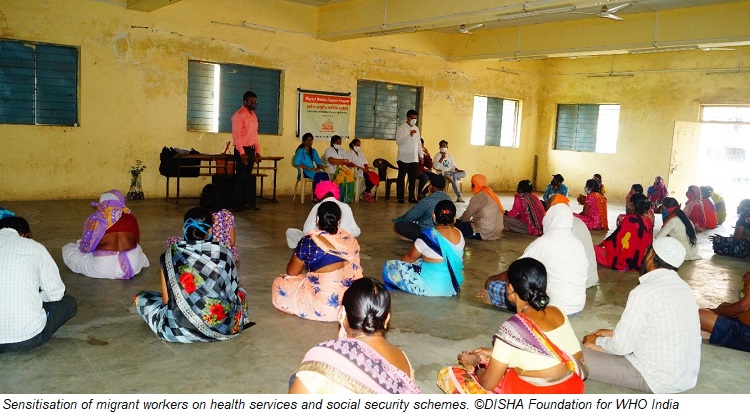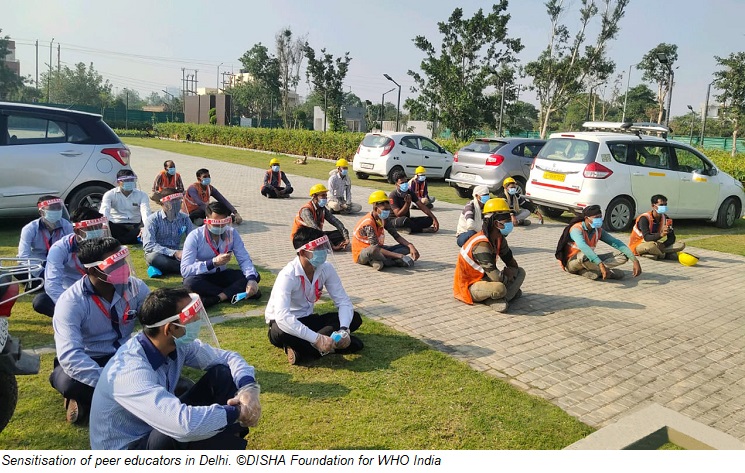Ram, 24, is from Bihar and was working as a labourer in Delhi when the lockdown was announced in March 2020. Fearing his safety, his family asked him to come home. With no transportation available during the lockdown, it took Ram several days to reach home.
Such incidents were far too many and too frequent in the early phases of the pandemic. COVID-19 has increased the visibility of vulnerable populations, more acutely than ever before. Constituting of around 28.3% of India’s workforce, internal migrants are primarily concentrated in the informal sector, characterised by low-paying, insecure jobs, hazardous and exploitative conditions of work. Internal migrants, and the precarious conditions of their lives and work, came out from behind closed doors to become one of the most pressing humanitarian concerns.

Leveraging its ‘whole of society’ approach through the involvement of civil society organisations (CSOs), WHO supported strengthening of community resilience to protect the health and well-being of vulnerable populations. In 2021, WHO collaborated with DISHA Foundation, a CSO, to address, strengthen, support migrant workers holistically and mitigate the COVID-19 pandemic adversities as best as possible. This was done in five locations - Delhi-NCR, Goa, Nagpur, Nashik and Shirdi - in consultation with local authorities.
The focus of this effort was to support migrant workers’ needs by providing awareness on health issues and information on other critical aspects to support their livelihood, social security awareness and financial literacy. Communities had barely recovered from the first wave when Delta emerged as a variant of concern and exacerbated the ongoing challenges such as extended lockdowns and restrictions that limited mobility of migrants and put an unprecedented burden on the health system.
Crisis has a generative nature that often leads to collaboration and innovation beyond simple problem-solving. Amidst these challenges, leveraging the existing partnership with DISHA, using digital technology, WHO adopted solutions that ensured continued engagement and provided timely referral care and support to migrant workers. Online awareness sessions, one-to-one meetings for migrants using Google Meet and WhatsApp networks conducted with local engagement led to increasing participation on these forums.
A resource bank of all relevant information, education and communication materials in local languages from the Ministry of Health and Family Welfare and WHO was collated to disseminate timely and consistent messages to the communities. Migration Information Resource Centre vans were also set up across all locations to engage with the migrant workers at wok sites. Further, through referral tie-ups and health camps conducted with the support of local government hospitals and medical colleges in project locations, migrants were supported with need-based health services/screening. Over 73,000 migrants were engaged and supported with information and access to health, financial inclusion, and social security services provided by the government.
When the country's COVID-19 vaccination programme was rolled out and started picking up pace, the migrant workers initiative was expanded to promote vaccine uptake among this important group. A rapid assessment to understand the migrants' needs and opinions on COVID-19 vaccine and CAB was conducted. The survey provided insights into the migrants' knowledge about COVID-19, COVID-19 vaccination, reasons for vaccine hesitancy, challenges faced while registering for vaccines, key factors and stakeholders that may influence the decision for getting vaccinated. Over 12 000 migrants were then supported for vaccine registration, and 7 500 migrants were mobilised for championing COVID-19 vaccination across project sites.
“Health awareness sessions, where accurate information on COVID-19 is regularly shared, have helped migrants understand the importance of following CAB, taking vaccination, and also addressed many rumours and misconceptions around COVID-19 vaccine,” said Vimal Pagare, a migrant worker from Nashik, Maharashtra.
For long-term sustainable support to migrants, it was recognised that young leaders among the migrant community must be engaged to build their capacity to become peer educators. Vimal, mentioned above is among the 350 peer educators who have been identified and trained to maximise the reach of these interventions. These peer educators supported by raising awareness about COVID-19, promote CAB and vaccine uptake and disseminate information on various health and social security services and how to avail them

“WHO India, through its strategic engagement with civil society partners, supports efforts to enhance health outcomes among the most vulnerable communities. Strengthening such interventions plays a pivotal role in building community readiness and resilience to help reduce the impact of COVID-19 pandemic and other health emergencies among the people at risk,” said Dr Roderico Ofrin, WHO Representative to India.
Finally, in this multi-pronged strategy to reduce vulnerability of migrant workers and mitigate the adverse impact of COVID-19 pandemic on their health and well-being, support and engagement of relevant government departments regularly was extremely important. Local (region-specific) CSOs, government departments and healthcare workers were engaged to address additional needs of migrant’s, such as providing short-term financial assistance during COVID-19, sessions for additional skill development and continuing essential health services. Together, they not only supported but ensured issues were addressed in a timely manner and services were available, in-turn helping over 48 000 migrants.